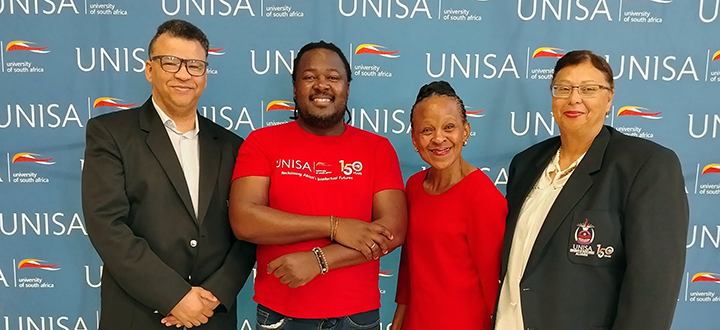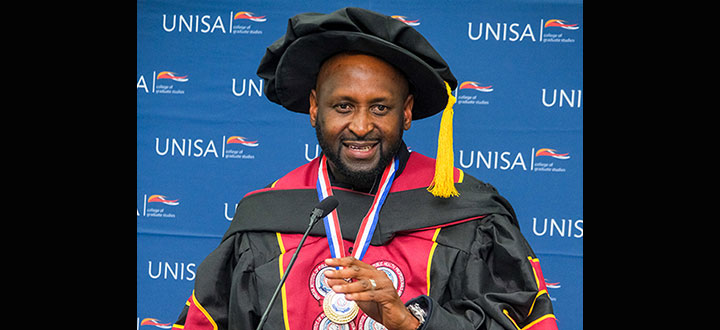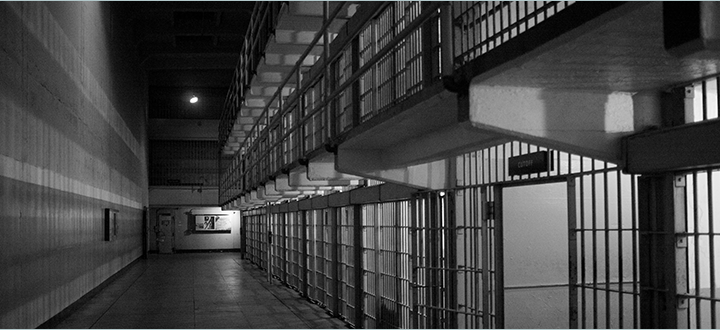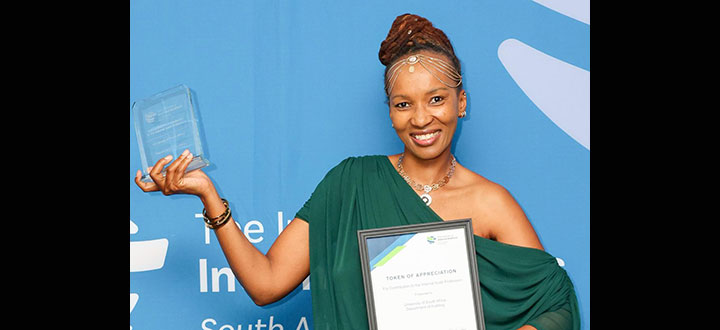News & Media
Unisa conference empowers men and boys to say no to violence

On 21 November 2025, the Unisa Women’s Forum (UWF), in collaboration with the Office of the Registrar and the College of Human Sciences, hosted the 4th Annual Men’s Conference virtually.
The dialogue, themed "Men and Boys Matter: Reimagining Gender Inclusion in South Africa’s Systems", was held in commemoration of International Men’s Day and the 16 Days of Activism for No Violence Against Women and Children Campaign, which takes place from 25 November to 10 December 2025. It aimed to contribute to a more balanced pursuit of equality for all.
In his welcome address, Dr Daniel Mosako, Acting Chair of the Department of Art and Music, stated that the conference marked a call to action for men to play an important role in society. He encouraged men to reflect on their roles in the workplace, their families and their communities. Mosako also expressed his support for the intended national shutdown to declare gender-based violence and femicide (GBVF) a national disaster.
Delivering the keynote address, Dr (Adv) Nzumbululo Siphuma of Unisa’s College of Law highlighted that although South Africa has made progress in promoting women’s rights since 1994, men’s experiences within the changing systems remain under-examined. He argued: "Including men and boys in gender policy and programming is not a diversion from the fight against GBVF. Rather, it is a critical strategy for preventing violence before it occurs."
Siphuma acknowledged the National Strategic Plan (NSP) on GBVF and explained that, as the South African experience demonstrates, legal frameworks alone cannot stop GBVF because there are deeply rooted social conditions that enable violence.
As social conditions, he highlighted limited support systems for men and boys facing mental challenges, unemployment, peer pressure, divorce and substance abuse, emphasising that without accessible support structures, men often internalise trauma, which manifests as violence as a form of stress relief. He stated that South Africa needs an NSP on men and boys to establish community-based counselling services and workplace mental health initiatives.
Mlibo Qoboshiyane, a member of the Eastern Cape Provincial Legislature, emphasised the need for systems of support and policies that are fair and inclusive. He called for the examination of men’s social, professional and familial roles, highlighting that gender equality is not solely about women, although women's empowerment is commendable.
Qoboshiyane mentioned that men’s unemployment and underemployment can lead to feelings of inadequacy, which can enable violence. He encouraged evidence-based dialogues to examine existing policies and their effectiveness.
Prof Lesiba Teffo of the College of Human Sciences urged attendees to dismiss the use of non-inclusive language and to embrace inclusive language to promote gender inclusivity. Teffo criticised the glorification of alcohol in black communities as it contributes to the perpetuation of violence. He called for victim empowerment centres for men to foster access to help and emphasised the role of families as the first line of defence to educate men.
Drawing from his PhD thesis, Dr Emmanuel Rowlands discussed existing systematic gaps and advocated for male-friendly support systems and public awareness campaigns to foster gender inclusivity.
A representative of the UWF, Prof Khanyisile Mbatha, expressed that all genders are important and that we must work together for the future of our children.
* By Victor Malatji, Journalist Intern, Department of Institutional Advancement
Publish date: 2025-11-26 00:00:00.0


 Unisa alumni inspire Elswood Secondary School learners to strive for excellence
Unisa alumni inspire Elswood Secondary School learners to strive for excellence
 Unisa conference empowers men and boys to say no to violence
Unisa conference empowers men and boys to say no to violence
 Unisa celebrates postgraduate and catalytic niche area excellence
Unisa celebrates postgraduate and catalytic niche area excellence
 Mangaung inmate turns a leaf by obtaining a Unisa LLB degree with multiple distinctions
Mangaung inmate turns a leaf by obtaining a Unisa LLB degree with multiple distinctions
 Another landmark achievement as IIA SA honours Unisa's Department of Auditing
Another landmark achievement as IIA SA honours Unisa's Department of Auditing